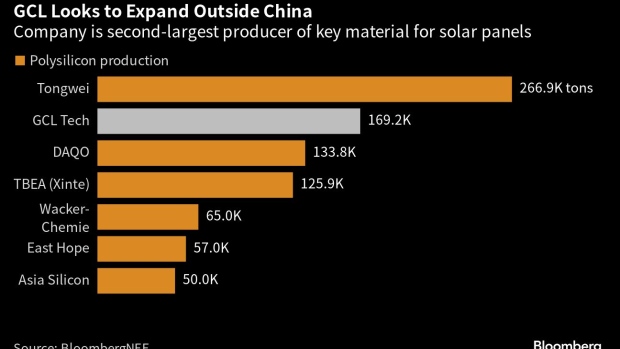
(Bloomberg) -- China-based solar sector supplier GCL Technology Holdings Ltd. is in advanced talks with Saudi Arabia about opening its first overseas factory as the nations aim to extend their energy ties beyond oil.
The world’s second-largest manufacturer of polysilicon, a key ingredient in solar panels, is looking to build a plant in the Middle Eastern nation which would produce 120,000 tons a year, Joint Chief Executive Officer Lan Tianshi said in an interview. GCL Tech could start operations as early as 2025, he said.
“Saudi Arabia has mature infrastructure and experience in industrial manufacturing,” Lan said in a separate interview with Bloomberg Television, adding that the country’s abundant sunlight could support its transition from oil giant to solar energy producer.
GCL Tech could consider also establishing outposts in other countries, though is most advanced in Saudi Arabia, Lan said Thursday in Hong Kong. The company has already filed for registration in the nation, has a team on the ground and is in talks with the local government and royal commissions,
The Chinese company’s interest is the latest sign of increased energy cooperation between the two countries after President Xi Jinping visited Riyadh in December. At last month’s BRICS forum, China also invited Saudi Arabia and other top oil exporters to join the group.
Chinese solar companies are currently struggling with dwindling margins under fierce competition, and Lan said he expects a wave of consolidation in the solar supply chain with just five to 10 companies ultimately surviving.
Polysilicon prices have plummeted since the beginning of the year, driving several producers to discontinue operations in June. A huge oversupply of the material is expected in the second half of the year, according to BloombergNEF.
However, lower solar prices have boosted demand both in China and elsewhere. Asia’s largest economy is set to install record capacity this year, as much as 140 gigawatts, according to the China Photovoltaic Industry Association.
By setting up new infrastructure in Saudi Arabia, GCL would tap into the country’s large potential market and the higher prices that polysilicon yields overseas. From the Middle East, the material could also more easily reach consumers in Africa and Europe.